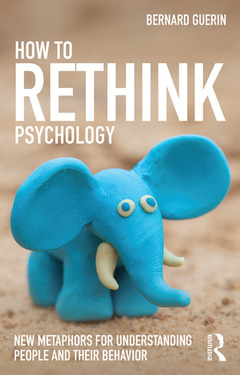Description
How to Rethink Psychology
New metaphors for understanding people and their behavior
Exploring the Environmental and Social Foundations of Human Behaviour Series
Author: Guerin Bernard
Language: English
Subject for How to Rethink Psychology:
Keywords
behaviorism; causality; cognitive processing; popular psychology; Skinner; social behavior; social constructionism; social contextualism; social strategies; the self; Cat Walked; Original Virtual Reality; Cognitive Polyphasia; Contextual Observations; External Social Contexts; Social Responding; Virtual Reality Machine; Behavior Analysts; Brute Events; Overburden; Early Twentieth Century Physicists; Background Resonances; Cricket Bat; Concert Tonight; Electromagnetic Waves; Glove Movements; Transmission Tower; DSM Series; Multiple Thoughts; Conversational Strategies; Causal Thinking; Vulcan Mind Meld; Causal Metaphor; Behavioral Knowledge; Understanding People
Publication date: 07-2015
· 13.8x21.6 cm · Paperback
Publication date: 08-2015
· 13.8x21.6 cm · Hardback
Description
/li>Contents
/li>Readership
/li>Biography
/li>
Based on the author?s forty years of experience in psychology, philosophy, and the social sciences, How to Rethink Psychology argues that to understand people we need to know more about their contexts than the dominant modes of thinking and research presently allow. Drawing upon insights from sources as diverse as Freud, CBT, quantum physics, and Zen philosophy, the book offers several fascinating new metaphors for thinking about people and, in doing so, endeavors to create a psychology for the future.
The book begins by discussing the significance of the key metaphor underlying mainstream psychology today ? the ?particle? or ?causal? metaphor ? and explains the need for a shift towards new ?wave? or ?contextual? metaphors in order to appreciate how individual and social actions truly function. It explores new metaphors for thinking about the relationship between language and reality, and teaches the reader how they might reimagine the processes involved in the act of thinking itself. The book concludes with a consideration of how these new metaphors might be applied to practical methods of research and understanding change today.
How to Rethink Psychology is important reading for upper-level and postgraduate students and researchers in the fields of social psychology, critical psychology, and the philosophy of psychology, and will especially appeal to those studying behavior analysis and radical behaviorism. It has also been written for the general reading public who enjoy exploring new ideas in science and thinking.
1. Understanding our Own Psychology: Alternative ways to Think 2. The Ubiquitous Social: From Social Constructionism to Social Contextualism 3. Language Use as the Original Virtual Reality 4. Thinking, Self Talk and How to Read Minds 5. The Zen of Running Our Lives: Doing, Thinking and Talking
Bernard Guerin is Professor of Psychology at the University of South Australia.




